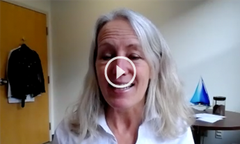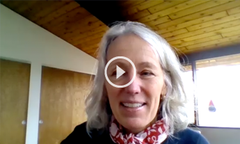
Larotrectinib Shows High Efficacy in Differentiated Thyroid Cancer
Lori Wirth, MD, discusses the subanalysis of patients with thyroid cancer with NTRK fusion mutations in clinical trials for larotrectinib.
Lori Wirth, MD, associate professor of medicine at Harvard Medical School and medical director for the Center for Head and Neck Cancers at Massachusetts General Hospital, discusses the subanalysis of patients with thyroid cancer in clinical trials for larotrectinib (Vitrakvi).
The LOXO-TRK-14001 (NCT02122913), SCOUT (NCT01595529), and NAVIGATE (NCT02576431) single-arm trials of larotrectinib in patients with a variety of cancer types led to its approval by the FDA for patients with solid tumors and an NTRK fusion mutation when the tumor is metastatic or not resectable and there are no other treatments available. According to Wirth, a subset analysis of 29 adult and pediatric patients with thyroid cancer showed that these patients had some of the best responses to larotrectinib.
Of the total 28 evaluable patients with thyroid cancer with NTRK fusions, the overall response rate (ORR) was 71%, but when only considering patients with differentiated thyroid cancer, including papillary and follicular thyroid carcinoma, larotrectinib showed extremely high efficacy, with an ORR of 86%.
In 7 patients with anaplastic thyroid cancer, however, the ORR was only 29%. Wirth says the duration of response in these patients was also lower than in patients with differentiated thyroid cancer. For all 28 patients, the overall median time to response was 1.9 months (range, 1.6-3.7) with a Kaplan-Meier estimated 24-month duration of response (DOR) of 81% (95% CI, 60-100).
Wirth observed patients from the trials who continued to receive larotrectinib therapy for over 4 years, citing the high duration of response and tolerability of the therapy.
TRANSCRIPTION:
0:08 | There were 3 different trials that pooled the data, and there have been several recent presentations. The most recent presentation of the thyroid cancer patient population was done by Steve Waguespack, [MD], at the American Thyroid Association meeting this year in 2021. One of the things that I think is really important to highlight about that analysis is that of the adults enrolled across the larotrectinib trials, there were 2 solid tumors that were most commonly represented in the larotrectinib trials, and those 2 solid tumors were thyroid cancer and soft tissue sarcomas.
Differentiated thyroid cancer really is a poster child for NTRK-driven malignancies. There were 29 patients with thyroid cancer that were enrolled across the larotrectinib trials. What we saw in the patients with differentiated thyroid cancer: the ORR was 86%. There were also 7 patients that were enrolled who had anaplastic thyroid cancer with NTRK fusions. In those patients, we didn't see quite as high a response rate; the response rate was only 29% in anaplastic thyroid cancer, not only do we see a lower ORR, but also the responses were relatively short-lived, whereas in the patients with differentiated thyroid cancer, the responses in general were really quite durable. So, the median DOR, median progression-free survival hadn't even been reached yet. But we're seeing patients remain on larotrectinib with thyroid cancer beyond 57 months and in some cases, there have been patients enrolled in the trial and ongoing remaining in response beyond 4 years. So, the activity really is very good, and the responses are also really quite durable.






















